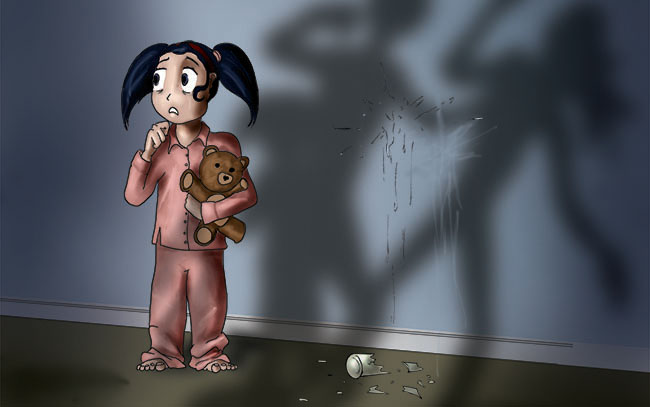ABUSIVE RELATIONSHIPS. CHILD ABUSE PREVENTION, ARTICLES
The Hidden Victims of Domestic Violence


It is easy to think that kids “don’t hear anything” or have no idea what is going on at home, simply because they are only children. However, research shows that kids are very aware of what goes on at home, especially when it involves abuse. According to www.canadianwomen.org, an estimated 362,000 children witness domestic violence every year. That means that infants, children, and teens, are often the hidden victims of abuse that occurs in their homes.
What is the effect of watching a parent undergo physical and emotional abuse by the hands of the other parent or partner? What if that abuser decides to turn on you, simply because you live in the same house?
Why Does Domestic Violence Happen?
Well, the issue may begin with physical or emotional violence within the family, but it is certainly not the root cause of the problem. Often, the abuser suffers from low self-esteem, sometimes addiction to drugs or alcohol, and a need for control over their partner; control which they gain through threats, constant put-downs and humiliation, control over finances and personal life, and physical violence. By creating an atmosphere of fear and dependency on them and their resources, they can ensure that their spouse does not leave them.
According to the Canadian Resource Centre for Victims of Spousal Abuse, a majority of abusers have experienced or witnessed domestic violence within their own childhoods. About 50% of domestic abusers in the United States express violence towards their own children. So what does that mean for the children witnessing abuse between their parents, or themselves becoming the direct victims of relentless name-calling, and/or battering? Most often, these children enter an on-going cycle of abuse. The feelings caused by watching a parent be abused are mostly the same from toddlers to teens; children feel isolated, afraid, completely helpless, angry, and confused. For school-age children, there are psychological, behavioural, and physical effects associated with being victims of abuse. They often show signs of depression, high anxiety, an extreme fear of failure or getting in trouble, aggression, and low self-esteem. In young children, it is common to see disturbances in sleep and eating, headaches, and separation anxiety.
Regardless of age, kids need a safe space to express what they are feeling.
Younger children, however, are a lot more helpless and unable to tackle these situations on their own. Teens, on the other hand, are able to take matters into their own hands. It is likely that if the teen has been a victim of domestic violence for a long enough time, they will tend to deal with the feelings of hurt and anger in more negative ways. Teens who are affected by domestic abuse often have low self-esteem, poor social skills, are more likely to seek drugs and alcohol to cope, are more likely to run away from home, display suicidal behaviour, become involved in criminal activity, early sexual activity, and violent/aggressive behaviour.
It may be difficult for a child who has been raised in an abusive home, especially for a large majority of their life, to differentiate between what is normal family life and what isn’t. Although they are probably fully aware of their situation and of the fear, anger, and confusion that comes with it, the lack of modelling of a loving and caring relationship can be detrimental to how they handle their own relationships, both with friends and romantic partners. Boys who grow up in abusive homes are more likely to become abusive partners than boys who grow up in non-violent homes, whereas females are more likely to become victims of abusive having witnessed abuse in their childhoods.
What Can Be Done?
Regardless of age, kids need a safe space to express what they are feeling. If you are a parent who is facing abuse, acknowledge that your child knows much more than you suspect, and allow them to feel safe enough to speak to you about it. If you are a friend, teacher, or significant other, make sure you are providing a safe space like a classroom, a park, or your home for them to escape reality for a while. Allowing them to speak about what they are witnessing and to let them know that they are loved, cared about, and that whatever is happening, is not their fault. Often, teens that witness domestic violence feel that they should have done something to stop it, or the abuser tells them it is their fault or that they are worthless. It is important that they understand this is not the case as watching abuse mixed with low self-worth can lead to aggressive and negative behaviours. If you feel that the situation is becoming unsafe for your friend then you should speak to an authority at school or another adult, call KidsHelpPhone, or seek help from a social services center that can provide further advice and information.
By Adela Czyzewska
Resources:







